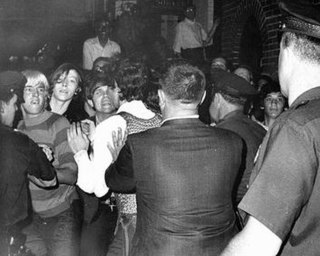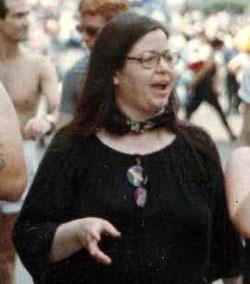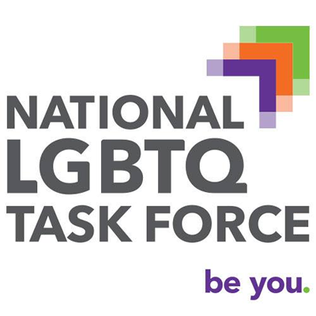
The Stonewall riots, also known as the Stonewall uprising, Stonewall rebellion, Stonewall revolution, or simply Stonewall, were a series of spontaneous demonstrations against a police raid that took place in the early morning hours of June 28, 1969, at the Stonewall Inn, in the Greenwich Village neighborhood of New York City. Although the demonstrations were not the first time American homosexuals fought back against government-sponsored persecution of sexual minorities, the Stonewall riots marked a new beginning for the gay rights movement in the United States and around the world.

The Stonewall Inn is a gay bar and recreational tavern at 53 Christopher Street in the Greenwich Village neighborhood of Manhattan in New York City. It was the site of the 1969 Stonewall riots, which led to the gay liberation movement and the modern fight for LGBT rights in the United States. When the riots occurred, Stonewall was one of the relatively few gay bars in New York City. The original gay bar occupied two structures at 51–53 Christopher Street, which were built as horse stables in the 1840s.

Christopher Street is a street in the West Village neighborhood of the New York City borough of Manhattan. It is the continuation of 9th Street west of Sixth Avenue.

The First Battle of Kernstown was fought on March 23, 1862, in Frederick County and Winchester, Virginia, the opening battle of Confederate Maj. Gen. Thomas J. "Stonewall" Jackson's campaign through the Shenandoah Valley during the American Civil War.
The Battle of McDowell, also known as the Battle of Sitlington's Hill, was fought on May 8, 1862, near McDowell, Virginia, as part of Confederate Major General Stonewall Jackson's 1862 Shenandoah Valley campaign during the American Civil War. After suffering a tactical defeat at the First Battle of Kernstown, Jackson withdrew to the southern Shenandoah Valley. Union forces commanded by Brigadier Generals Robert Milroy and Robert C. Schenck were advancing from what is now West Virginia towards the Shenandoah Valley. After being reinforced by troops commanded by Brigadier General Edward Johnson, Jackson advanced towards Milroy and Schenck's encampment at McDowell. Jackson quickly took the prominent heights of Sitlington's Hill, and Union attempts to recapture the hill failed. The Union forces retreated that night, and Jackson pursued, only to return to McDowell on 13 May. After McDowell, Jackson defeated Union forces at several other battles during his Valley campaign.

Marsha P. Johnson was an American gay liberation activist and self-identified drag queen. Known as an outspoken advocate for gay rights, Johnson was one of the prominent figures in the Stonewall uprising of 1969.

Stonewall Democrats, also known in some states as LGBT Democrats, is a caucus within the Democratic Party that advocates for issues that are relevant to LGBT Americans. The caucus primarily operates through individual chapters or political clubs supporting LGBTQ rights and affiliated with the Democratic Party.

Brenda Howard was an American bisexual rights activist and sex-positive feminist. The Brenda Howard Memorial Award is named for her.

Vito Russo was an American LGBT activist, film historian, and author. He is best remembered as the author of the book The Celluloid Closet, described in The New York Times as "an essential reference book" on homosexuality in the US film industry. In 1985, he co-founded the Gay and Lesbian Alliance Against Defamation (GLAAD), a media watchdog organization that strives to end anti-LGBT rhetoric, and advocates for LGBT inclusion in popular media.

The NYC Pride March is an annual event celebrating the LGBTQ community in New York City. The largest pride parade and the largest pride event in the world, the NYC Pride March attracts tens of thousands of participants and millions of sidewalk spectators each June, and carries spiritual and historical significance for the worldwide LGBTQIA+ community and its advocates. Entertainer Madonna stated in 2024, "Aside from my birthday, New York Pride is the most important day of the year." The route through Lower Manhattan traverses south on Fifth Avenue, through Greenwich Village, passing the Stonewall National Monument, site of the June 1969 riots that launched the modern movement for LGBTQ+ rights.

Craig L. Rodwell was an American gay rights activist known for founding the Oscar Wilde Memorial Bookshop on November 24, 1967 - the first bookstore devoted to gay and lesbian authors - and as the prime mover for the creation of the New York City gay pride demonstration. Rodwell, who was already an activist when he participated in the 1969 Stonewall uprising, is considered by some to be the leading gay rights activist in the early, pre-Stonewall, homophile movement of the 1960s.

New York state, a state in the northeastern United States, has one of the largest and the most prominent LGBTQ populations in the world. Brian Silverman, the author of Frommer's New York City from $90 a Day, wrote that New York City has "one of the world's largest, loudest, and most powerful" LGBT communities", and "Gay and lesbian culture is as much a part of New York's basic identity as yellow cabs, high-rises, and Broadway theatre". LGBT travel guide Queer in the World states, "The fabulosity of Gay New York is unrivaled on Earth, and queer culture seeps into every corner of its five boroughs". LGBT Americans in New York City constitute by significant margins the largest self-identifying lesbian, gay, bisexual, and transgender communities in the United States, and the 1969 Stonewall riots in Greenwich Village are widely considered to be the genesis of the modern gay rights movement.

LGBTQ history in the United States consists of the contributions and struggles of lesbian, gay, bisexual, transgender and queer (LGBTQ) people, as well as the LGBTQ social movements they have built.

The National LGBTQ Task Force is an American social justice advocacy non-profit organizing the grassroots power of the lesbian, gay, bisexual, transgender, and queer (LGBTQ) community. Also known as The Task Force, the organization supports action and activism on behalf of LGBTQ people and advances a progressive vision of liberation. The past executive director was Rea Carey from 2008-2021 and the current executive director is Kierra Johnson, who took over the position in 2021 to become the first Black woman to head the organization.

The Gay Liberation Monument is part of the Stonewall National Monument, which commemorates the Stonewall uprising of 1969. Created in 1980, the Gay Liberation sculpture by American artist George Segal was the first piece of public art dedicated to gay rights and solidarity for LGBTQ individuals, while simultaneously commemorating the ongoing struggles of the community. The monument was dedicated on June 23, 1992, as part of the dedication of the Stonewall National Monument as a whole.

New York City has been described as the gay capital of the world and the central node of the LGBTQ+ sociopolitical ecosystem, and is home to one of the world's largest and most prominent LGBTQ+ populations. Brian Silverman, the author of Frommer's New York City from $90 a Day, wrote the city has "one of the world's largest, loudest, and most powerful LGBT communities", and "Gay and lesbian culture is as much a part of New York's basic identity as yellow cabs, high-rise buildings, and Broadway theatre". LGBT travel guide Queer in the World states, "The fabulosity of Gay New York is unrivaled on Earth, and queer culture seeps into every corner of its five boroughs". LGBTQ advocate and entertainer Madonna stated metaphorically, "Anyways, not only is New York City the best place in the world because of the queer people here. Let me tell you something, if you can make it here, then you must be queer."

Stonewall National Monument is a 7.7-acre U.S. national monument in the West Village neighborhood of Greenwich Village in Lower Manhattan, New York City. The designated area includes the Stonewall Inn, the 0.19-acre Christopher Park, and nearby streets including Christopher Street, the site of the Stonewall riots of June 28, 1969, widely regarded as the start of the modern LGBT rights movement in the United States.
Stonewall 50 – WorldPride NYC 2019 was a series of LGBTQ events and celebrations in June 2019, marking the 50th anniversary of the 1969 Stonewall riots. It was also the first time WorldPride was held in the United States. Held primarily in the metropolitan New York City area, the theme for the celebrations and educational events was "Millions of moments of Pride." The celebration was the largest LGBTQ event in history, with an official estimate of 5 million attending Pride weekend in Manhattan alone, with an estimated 4 million in attendance at the NYC Pride March. The twelve-hour parade included 150,000 pre-registered participants among 695 groups.
The National LGBTQ Wall of Honor is a memorial wall in the Greenwich Village neighborhood of Manhattan in New York City, dedicated to LGBTQ "pioneers, trailblazers, and heroes". Located inside the Stonewall Inn, the wall is part of the Stonewall National Monument, the first U.S. National Monument dedicated to the country's LGBTQ rights and history. The first fifty inductees were unveiled June 27, 2019, as a part of events marking the 50th anniversary of Stonewall. Five honorees are added annually.

Stonewall is an American opera about the 1969 Stonewall riots, the spark of the modern LGBTQ rights movement, which received its world premiere June 2019 in conjunction with Stonewall 50 – WorldPride NYC 2019, projected to be the world's largest LGBTQ event. Stonewall was commissioned by New York City Opera (NYCO), and features music by Iain Bell, libretto by Pulitzer Prize-winning Mark Campbell, and direction by Leonard Foglia. The production is a 2019 Pride Initiative of the NYCO, an annual production of an LGBT-focused work each June in commemoration of Gay Pride Month. The opera premiered in June 2019 at the Rose Theater at Jazz at Lincoln Center. The opera was produced to honor both the 50th anniversary of the Stonewall Riots, and the 75th anniversary of the NYCO. Stonewall is the first opera to feature a transgender character written for an openly transgender singer, mezzo-soprano Liz Bouk.











